

The Future of the Democratic PartyAt George Washington University, December 8, 2004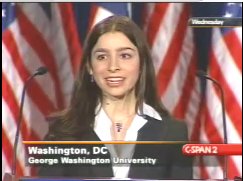
Melissa Bez, Senior at GWU: Ladies and gentlemen, good morning, and welcome. [She is interrupted by applause. She smiles while waiting for it to die down.] Bez: I was selected to introduce Governor Dean, because I was the outreach director last fall of GW's chapter of 'Generation Dean', the youth sector of the Dean For America movement. GW's chapter became one of the largest and most active in the country, and I am proud to have been associated with it. Governor Dean achieved national prominence during his campaign for the Democratic nomination for President. He began his campaign on a platform of balanced Federal budgets and universal health care, and was later thrust into the national spotlight for his outspoken opposition to the war in Iraq. The DeanForAmerica Presidential campaign was distinctive in its use of the Internet to organize supporters, and raise an unprecedented $30 million from average contributions of under a hundred dollars. Ladies and gentlemen, the future of the Democratic Party, Governor Howard Dean. [She walks off the stage and Howard Dean walks on. They shake hands as they pass. The audience cheers and gives him a prolonged standing ovation.] Governor Howard Dean: Thank you. [Simmers down the crowd:] Thank you, thank you, thank you. That must have been almost as good as when Jon Stewart was here, right guys? [General laughter] Let me thank Melissa for a very nice introduction. 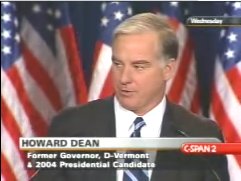
Let me tell you what my plan for the Democratic Party is: [Very seriously] We're going to win in Mississippi. 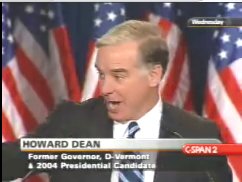
...and then we're gonna win in Alabama ...and South Carolina! 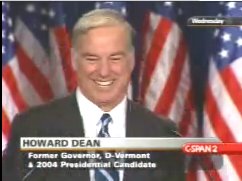
Four years ago, the President won with 49 percent of the vote, And the Republican Party treated it like it as a mandate, and the Democrats let them get away with it. 49% is not a mandate, and 51% is not a mandate, and this time they're not getting away with it. Our challenge today is not to re-hash what's already happened, but to look forward, to make the Democratic Party a 50-state party again, and, most importantly, to win. [Applause] To win the White House and a majority in Congress, yes. But to do the real work that will make these victories possible -- to put Democratic ideas and Democratic candidates in every office -- whether it be Secretary of State, supervisor of elections, county commissioner, school board member. Here in Washington, it seems that every time we lose an election, there's a consensus reached among decision-makers in the Democratic Party is that the way to win is to be more like Republicans. [Some scattered boos from the audience.] I suppose you could call that a philosophy, and this is the name of that philosophy: 'if you don't beat 'em, then join them.' 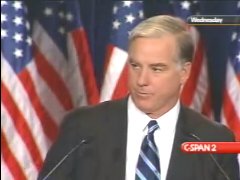
I'm not gonna make a prediction -- but if we accept that philosophy this time around, in four years from now another Democrat will be standing right here giving this same speech. We cannot win by being "Republican-lite." We've tried it; it does not work. [Applause] The question is not whether we move to the left or to the right. The question is not about our direction. We need to start focusing on our destination. There are some practical elements to the destination. The destination of the Democratic Party requires that it be financially viable-- we're able to raise money not just from big donors but small contributors, not just through dinners and telephone solicitations and direct mail, but also through the Internet and person-to-person outreach. The destination of the Democratic Party means making it a party that can communicate with its supporters and with all Americans. Politics is at its best when we create and inspire and sustain a sense of community. The tools that were pioneered in our campaign -- like blogs, and meetups, and most importantly, community-building -- are just a start. We have to use all the power and potential of technology as part of an aggressive outreach to meet and include voters, to work with the state parties, and influence media coverage. 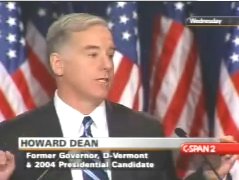
And of course the most practical, and important destination is winning elective office. But we have to do that at every level of government. The way to rebuild the Democratic Party is not from the consultants down, it is from the ground up. [Applause] We have some real successes to build on. We raised more money than the Republican National Committee, and we did it by attracting thousands of small donors. This is the first time in my memory that the Democratic National Committee is not coming out of a national campaign in debt. We trained tens of thousands of new activists. We put together the most sophisticated get-out-the-vote operation our Party has ever had. We registered millions of new voters, including a record number of minority voters and young voters. And those new voters overwhelmingly voted Democratic. [Applause] [This line was not in the C-Span video - ed: Now we need to build on our successes while transforming the Democratic Party into a grassroots organization that can win in 50 states.] 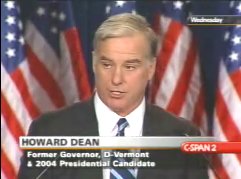
I've seen all the doomsday predictions that the Democratic Party could shrink to be a regional Party. A Party of the Northeast and the Pacific Northwest. We cannot any longer be a Party that seeks the presidency by running an 18-state campaign. We can't be a party that cedes a single state, a single District, a single precinct, or even a single voter. As many of the candidates supported by my organization called Democracy for America -- [gestures at the audience] no, your organization called Democracy For America-- people in places that we have ignored for too long, we find are hungry for an alternative; they want candidates with new idears, they want new candidates, and they're willing to elect Democrats. Since we started Democracy for America last March, we raised over $5 million, mostly from small donors. That money was used to help 748 candidates in 46 states at every level of government. We helped a Democratic governor get elected in Montana and New Hampshire, a Democratic mayor get elected in Salt Lake County, Utah -- I see somebody's from Utah-- [Cheers and applause] We helped Lori Saldaña in San Diego. Lori's a Latina grassroots environmental organizer. She was outspent in both the primary and the general election. She won a seat on the California state assembly. We also helped Anita Kelly become the first African-American woman ever elected to her circuit court in Montgomery Alabama. And it turns out that Judge-elect Kelly is here with us today, and I'd ask her to stand up and be recognized. 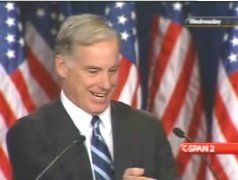 
[Anita Kelly, who is seated in the front row, stands up and the audience applauds her.] [Dean smiles at her:] And we know that every candidate's work is the most important work, Judge, but you don't have me to thank. You have these folks to thank, 'cause a lot of them are members of Democracy For America. Fifteen of the candidates we helped win last month had never run for political office before. In Texas, a little-known candidate who'd been written off completely ran the first competitive race against Tom Delay in over a decade. Other-- [He is interrupted by applause] ...Other candidates who lost but came very close include Scott Kawasaki, who lost by only 45 votes for a Alaska state legislative race in a very Republican state. We can win in these states, and we will. 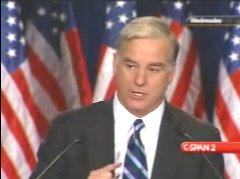
There are no red states or blue states, they are all American states. And if we can compete at all levels and in the most conservative parts of this country, we can win at any level and anywhere. [Applause] People will vote for Democratic candidates in Alabama, and Texas, and Utah if we knock on their door, if we introduce ourselves, and if we tell them what we believe. There is another destination beyond strong finances and outreach and campaigns. That destination is a better, stronger, safer, smarter, healthier America. An America where we do not turn our backs on our own people. That America can only be built with conviction. When some people say we should change direction, in essence they are arguing that our basic or guiding principles can be altered or modified. They cannot. On issue after issue, we are where the majority of the American people are. 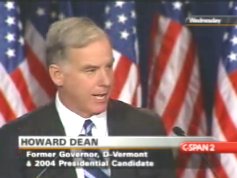
What I want to know is at what point did it become a radical idear to stand up for what we believe? [Applause] Fifty years ago, Harry Truman said that "We're not going to get anywhere by trimming or by appeasing. And we ought not to try it." And we are still making the same mistakes. Lemme tell you something: there is only one thing that the Republican power brokers want more than for us to lurch to the left -- and that's for us to lurch to the right. Because what they fear the most is that we may really begin fighting for what we believe -- fiscal responsibility, socially progressive values for which Democrats have always stood and fought. So I'll give this to the Republicans. They know the America that they want. They want a government that's so small, as one of them once said, they can drown it in a bathtub. They want a government that runs big deficits, but they want a government small enough to fit into your bedroom. They want a government that is of, and by, for their special interest friends. They want a government that preaches compassion but practices division. They want wealth rewarded over work. And they are willing to use any means necessary in order to get it. But in going from record surpluses to record deficits, the Republican Party has relinquished the mantle of fiscal responsibility. Now they're talking about borrowing another $2 trillion in order to take away Social Security benefits from senior citizens. In going from record job creation to record job loss, they have abandoned the mantle of economic responsibility. In cutting health care, education, and community policing programs... and in failing to invest in America's inner cities, and distressed rural communities... they certainly have no desire or pretense of claiming the mantle of social responsibility. In their refusal to embrace real electoral reform or conduct the business of government in the light of day, they are hardly the model of civic responsibility. In their willingness to change the rules so that their indicted leaders can stay in power, they have even given up any claim on personal responsibility. [Applause] And in starting an international conflict based on misleading information, I believe they have abdicated America's moral responsibility, as well. [Applause] There is a Party of fiscal responsibility... economic responsibility... social responsibility... civic responsibility... personal responsibility... and moral responsibility. That party is the Democratic Party. [Cheers and applause] We need to be able to say strongly, and firmly, and proudly what we believe, because we are what we believe. We believe every person in America ought to have access to affordable health care. It is wrong that we remain the only industrialized nation on the face of the earth that does not assure health care for all of its citizens. We believe that the path to a better future goes directly through our public schools. I have nothing against private schools, parochial schools and home schooling, and I think that parents with the means and inclination should choose whatever they believe is best for their children. But those choices cannot compete, and cannot come at the expense of what has been -- and what must always be -- the great equalizer in our society, a free and equal public education. [Applause] We believe that if you put in a lifetime of work, you have earned a retirement of dignity -- not one that is put at risk by your government or by unethical business practices. The first time our nation balanced its budget, it was Andrew Jackson, the father of the Democratic Party, who did it. The last time our nation balanced its budget, it was Bill Clinton who did it. I did it every year as Governor. Democrats believe in fiscal responsibility and we are the only ones who have delivered it. [Applause] We believe that every single American has a voice and that it ought to be heard in the halls of power every day. And it most certainly ought to be heard on Election Day. Democracies around the world look at us as a model. How can we be worthy of their aspirations when we have not done enough to guarantee accurate elections for our own people? [Applause] [This line was not in the C-Span video - ed: We believe in a strong and secure America... And we believe we will be stronger by having a moral foreign policy.] We need to embrace real political reform -- because only real reform will pry government from the grasp of the special interests who fight against reform and progress for everybody else. 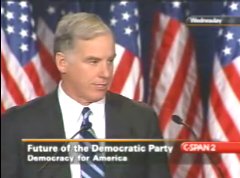
The pundits have said this election was decided on the issue of moral values. I don't believe that. It is a moral value to provide health care. It is a moral value to educate our young people. The sense of community that comes from full participation in our Democracy is a moral value. Honesty is a moral value. [Applause] If this election had been decided on moral values, the Democrats would have won. [Applause] I think it's time for us to start framing the debate. We have to learn to punch our way off the ropes. We have to set the agenda. We should not hesitate to call for reform -- reform in elections, reform in health care, reform in education, reforms that promote ethical business practices. And, yes, we need to talk about internal reforms in the Democratic Party as well, and I'll be talking about that more in the days ahead. [Applause] Reform is the hallmark of a strong Democratic Party. Those who stand in the way of reform cannot be the focus of our attention for only four months out of every four years. Reform is a daily battle. And we must pursue those reforms with conviction -- every day, at every levels of government, in every state. A little while ago, at a fundraiser, a woman came to me and identified herself as an evangelical Christian from Texas. And I asked her what you may be wondering -- what was she doing at my fundraiser, supporting me? 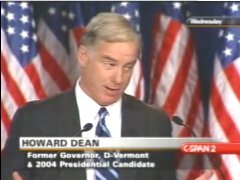
[Some chuckles from the audience, Dean smiles.] And she said there were two reasons she was supporting me. The first was that she and her husband had a child who had poly-cystic kidney disease, and that illness made it impossible for her to get health insurance, either for her child or for her family in the state of Texas. 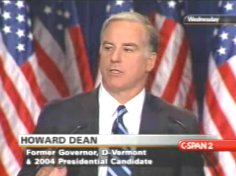
And the second thing she said was, "But the real reason we're with you is because evangelical Christians are people of deep conviction, and you're a person of deep conviction. And what we want more than anything else, is not that you agree with every conviction, no matter how important that may be; what we want more than anything else is to know that if something happens to our family or happens to our country -- the people in office will act out of deep conviction." [Applause] We are what we believe. And the American people know it. And I believe that over the next two... and four... and ten years, however long it takes, election by election, state by state, precinct by precinct, door by door, vote by vote, we will lift this Party up, and take America back for the people who built it. Thanks very much. [The audience gives him a standing ovation as he leaves the stage, waving to them.] From a transcript originally posted at BlogForAmerica, vetted with the C-Span video by Crocuta. |

.
.
 |
